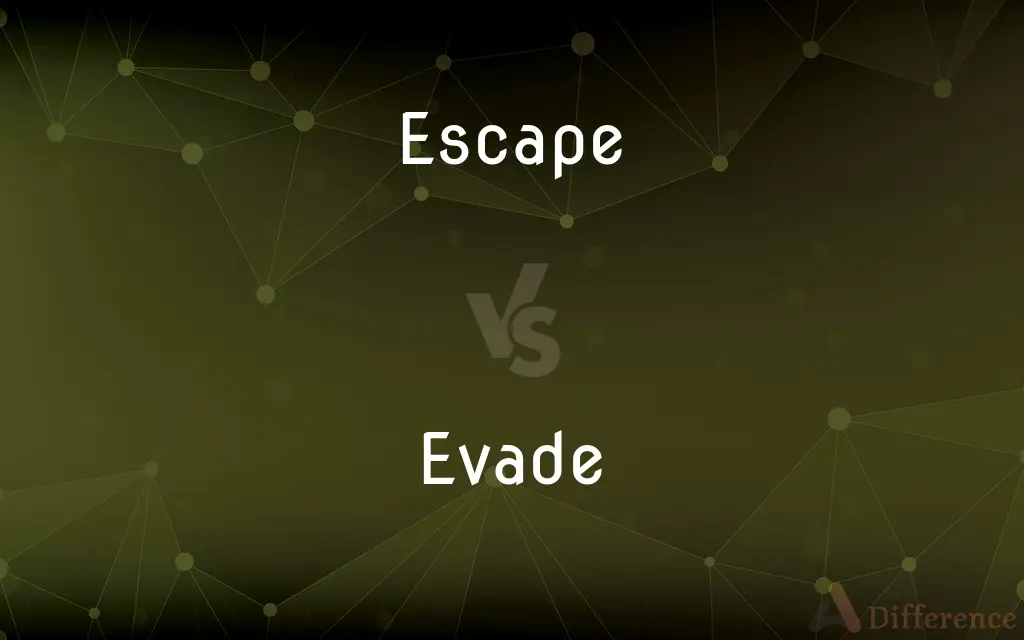Escape vs. Evade — What's the Difference?
By Urooj Arif & Fiza Rafique — Updated on April 8, 2024
Escape involves breaking free from confinement or danger, focusing on leaving a situation; evading is about avoiding detection or eluding something, emphasizing stealth or circumvention.

Difference Between Escape and Evade
Table of Contents
ADVERTISEMENT
Key Differences
Escape primarily refers to the act of getting away or breaking free from something, such as confinement, captivity, or a dangerous situation. For instance, one might escape from prison or a burning building, where the focus is on the act of leaving or getting out. Whereas evade is more about avoiding or eluding something, especially in a skillful or cunning way. This could involve dodging a pursuer, sidestepping a question, or avoiding capture, emphasizing not being caught or hit.
In the context of physical danger, escaping implies a direct and often urgent movement away from a threat. This could be running out of a collapsing structure or swimming away from a sinking ship. On the other hand, evading would involve actions like hiding, using cover, or moving stealthily to avoid being seen or caught by the threat.
Escape has a sense of immediacy and emergency, suggesting a direct flight from peril. For example, escaping from a car accident scene or an abusive situation. Meanwhile, evade might involve more planning and strategy, suggesting a careful maneuvering to avoid a situation or consequence, like evading arrest by changing one's appearance or using a fake identity.
While escape often requires overcoming physical barriers, evade tends to deal more with abstract obstacles or threats. For instance, escaping from handcuffs versus evading surveillance or scrutiny.
Escape can also imply a successful conclusion to a predicament, such as finally escaping poverty or addiction. Evade, however, carries a nuance of temporariness and possibility of future confrontation or capture, like evading taxes or responsibilities, which might catch up to the individual later.
ADVERTISEMENT
Comparison Chart
Primary focus
Breaking free from confinement or immediate danger
Avoiding detection or avoiding being directly confronted
Typical context
Physical confinement, dangerous situations
Surveillance, questions, responsibilities
Sense of action
Direct and urgent movement away from something
Stealthy, cunning avoidance
Outcome
Often implies a successful conclusion to a predicament
Implies a temporary sidestepping of an issue
Examples
Escaping from prison, a locked room, or a natural disaster
Evading capture, questions, or surveillance
Compare with Definitions
Escape
To be forgotten or not included.
An important detail escaped their notice during the investigation.
Evade
To not be caught by someone or something.
The thief evaded the security cameras by moving through blind spots.
Escape
To break free from confinement.
He managed to escape from the locked room by picking the lock.
Evade
To avoid facing something directly.
He evaded the question about his past with a vague answer.
Escape
To avoid a dangerous or unwanted situation.
She escaped the fire by climbing down the emergency ladder.
Evade
To avoid something undesirable.
They tried to evade taxes by hiding their income.
Escape
To slip away from someone or something.
The fugitive escaped the police by using a series of safe houses.
Evade
To escape from something by cleverness or deceit.
The spy evaded capture by changing her appearance.
Escape
To emerge from a constraint.
The gas escaped from the tank through a small hole.
Evade
To dodge something moving towards oneself.
The player evaded the tackle with a quick sidestep.
Escape
Break free from confinement or control
Two burglars have just escaped from prison
Evade
Escape or avoid (someone or something), especially by guile or trickery
Friends helped him to evade capture for a time
Escape
Fail to be noticed or remembered by (someone)
It may have escaped your notice, but this is not a hotel
The name escaped him
Evade
To escape or avoid, especially by cleverness or deceit
Managed to evade their pursuers.
Went underground in order to evade arrest.
Escape
Interrupt (an operation) by means of the escape key.
Evade
To avoid complying with or fulfilling
Evade the draft.
Evaded any legal responsibility.
Escape
An act of breaking free from confinement or control
He could think of no way of escape, short of rudeness
The gang had made their escape
Evade
To fail to make payment of (taxes).
Escape
A form of temporary distraction from reality or routine
Romantic novels should present an escape from the dreary realities of life
Evade
To avoid giving a direct answer to
Talked at length but evaded the interviewer's question.
Escape
A leakage of gas, liquid, or heat from a container
A lid prevents the escape of poisonous gases
A gas escape
Evade
To be beyond the memory or understanding of
The point of the article evades me.
Escape
A key on a computer keyboard which either interrupts the current operation or causes subsequent characters to be interpreted differently.
Evade
To use cleverness or deceit in avoiding or escaping something.
Escape
To break loose from confinement; get free
Escape from jail.
Evade
To avoid complying with or fulfilling a requirement.
Escape
To issue from confinement or enclosure; leak or seep out
Gas was escaping from the vent.
Evade
(transitive) To get away from by cunning; to avoid by using dexterity, subterfuge, address, or ingenuity; to cleverly escape from
He evaded his opponent's blows.
The robbers evaded the police.
To evade the force of an argument
Escape
To avoid a serious or unwanted outcome
Escaped from the accident with their lives.
Evade
(transitive) To escape; to slip away; — sometimes with from.
Escape
(Biology) To become established in the wild. Used of a plant or animal.
Evade
(intransitive) To attempt to escape; to practice artifice or sophistry, for the purpose of eluding.
Escape
(Computers) To interrupt a command, exit a program, or change levels within a program by using a key, combination of keys, or key sequence.
Evade
To get away from by artifice; to avoid by dexterity, subterfuge, address, or ingenuity; to elude; to escape from cleverly; as, to evade a blow, a pursuer, a punishment; to evade the force of an argument.
The heathen had a method, more truly their own, of evading the Christian miracles.
Escape
To succeed in avoiding
The thief escaped punishment.
Evade
To escape; to slip away; - sometimes with from.
Unarmed they mightHave easily, as spirits evaded swiftBy quick contraction or remove.
Escape
To break loose from; get free of
The spacecraft escaped Earth's gravitational field.
Evade
To attempt to escape; to practice artifice or sophistry, for the purpose of eluding.
The ministers of God are not to evade and take refuge any of these . . . ways.
Escape
To be outside the memory or understanding of; fail to be remembered or understood by
Her name escapes me. The book's significance escaped him.
Evade
Avoid or try to avoid fulfilling, answering, or performing (duties, questions, or issues);
He dodged the issue
She skirted the problem
They tend to evade their responsibilities
He evaded the questions skillfully
Escape
To issue involuntarily from
A sigh escaped my lips.
Evade
Escape, either physically or mentally;
The thief eluded the police
This difficult idea seems to evade her
The event evades explanation
Escape
The act or an instance of escaping.
Evade
Practice evasion;
This man always hesitates and evades
Escape
A means of escaping.
Evade
Use cleverness or deceit to escape or avoid;
The con mane always evades
Escape
A means of obtaining temporary freedom from worry, care, or unpleasantness
Television is my escape from worry.
Escape
A gradual effusion from an enclosure; a leakage.
Escape
(Biology) A cultivated plant or a domesticated or confined animal that has become established in the wild.
Escape
(Computers) A key used especially to interrupt a command, exit a program, or change levels within a program.
Escape
(intransitive) To get free; to free oneself.
The prisoners escaped by jumping over a wall.
The factory was evacuated after toxic gases escaped from a pipe.
Escape
(transitive) To avoid (any unpleasant person or thing); to elude, get away from.
He only got a fine and so escaped going to jail.
The children climbed out of the window to escape the fire.
Escape
(intransitive) To avoid capture; to get away with something, avoid punishment.
Luckily, I escaped with only a fine.
Escape
(transitive) To elude the observation or notice of; to not be seen or remembered by.
The name of the hotel escapes me at present.
Escape
To cause (a single character, or all such characters in a string) to be interpreted literally, instead of with any special meaning it would usually have in the same context, often by prefixing with another character.
When using the "bash" shell, you can escape the ampersand character with a backslash.
Brion escaped the double quote character on Windows by adding a second double quote within the literal.
Escape
(computing) To halt a program or command by pressing a key (such as the "Esc" key) or combination of keys.
Escape
The act of leaving a dangerous or unpleasant situation.
The prisoners made their escape by digging a tunnel.
Escape
Leakage or outflow, as of steam or a liquid, or an electric current through defective insulation.
Escape
Something that has escaped; an escapee.
Escape
A holiday, viewed as time away from the vicissitudes of life.
Escape
(computing) escape key
Escape
(programming) The text character represented by 27 (decimal) or 1B (hexadecimal).
You forgot to insert an escape in the datastream.
Escape
(snooker) A successful shot from a snooker position.
Escape
(manufacturing) A defective product that is allowed to leave a manufacturing facility.
Escape
(obsolete) That which escapes attention or restraint; a mistake, oversight, or transgression.
Escape
(obsolete) A sally.
Escape
(architecture) An apophyge.
Escape
To flee from and avoid; to be saved or exempt from; to shun; to obtain security from; as, to escape danger.
Escape
To avoid the notice of; to pass unobserved by; to evade; as, the fact escaped our attention.
They escaped the search of the enemy.
Escape
To flee, and become secure from danger; - often followed by from or out of.
Haste, for thy life escape, nor look behind
Escape
To get clear from danger or evil of any form; to be passed without harm.
Such heretics . . . would have been thought fortunate, if they escaped with life.
Escape
To get free from that which confines or holds; - used of persons or things; as, to escape from prison, from arrest, or from slavery; gas escapes from the pipes; electricity escapes from its conductors.
To escape out of these meshes.
Escape
The act of fleeing from danger, of evading harm, or of avoiding notice; deliverance from injury or any evil; flight; as, an escape in battle; a narrow escape; also, the means of escape; as, a fire escape.
I would hasten my escape from the windy storm.
Escape
That which escapes attention or restraint; a mistake; an oversight; also, transgression.
I should have been more accurate, and corrected all those former escapes.
Escape
A sally.
Escape
The unlawful permission, by a jailer or other custodian, of a prisoner's departure from custody.
Escape
A plant which has escaped from cultivation.
Escape
An apophyge.
Escape
Leakage or outflow, as of steam or a liquid.
Escape
Leakage or loss of currents from the conducting wires, caused by defective insulation.
Escape
The act of escaping physically;
He made his escape from the mental hospital
The canary escaped from its cage
His flight was an indication of his guilt
Escape
An inclination to retreat from unpleasant realities through diversion or fantasy;
Romantic novels were her escape from the stress of daily life
His alcohol problem was a form of escapism
Escape
The unwanted discharge of a fluid from some container;
They tried to stop the escape of gas from the damaged pipe
He had to clean up the leak
Escape
A valve in a container in which pressure can build up (as a steam boiler); it opens automatically when the pressure reaches a dangerous level
Escape
Nonperformance of something distasteful (as by deceit or trickery) that you are supposed to do;
His evasion of his clear duty was reprehensible
That escape from the consequences is possible but unattractive
Escape
An avoidance of danger or difficulty;
That was a narrow escape
Escape
A means or way of escaping;
Hard work was his escape from worry
They installed a second hatch as an escape
Their escape route
Escape
A plant originally cultivated but now growing wild
Escape
Run away from confinement;
The convicted murderer escaped from a high security prison
Escape
Fail to experience;
Fortunately, I missed the hurricane
Escape
Escape potentially unpleasant consequences; get away with a forbidden action;
She gets away with murder!
I couldn't get out from under these responsibilities
Escape
Be incomprehensible to; escape understanding by;
What you are seeing in him eludes me
Escape
Issue or leak, as from a small opening;
Gas escaped into the bedroom
Escape
Remove oneself from a familiar environment, usually for pleasure or diversion;
We escaped to our summer house for a few days
The president of the company never manages to get away during the summer
Escape
Flee; take to one's heels; cut and run;
If you see this man, run!
The burglars escaped before the police showed up
Common Curiosities
What is the key difference between escape and evade?
Escape focuses on breaking free from confinement or danger, while evade emphasizes avoiding detection or eluding something.
Can animals evade and escape?
Yes, animals can both evade predators through stealth and escape from traps or enclosures.
Can escape and evade be used interchangeably?
While they can overlap in some contexts, their primary meanings and nuances differ, making them not fully interchangeable.
Is escaping always physical?
Primarily, but it can also refer to abstract forms, like escaping poverty.
Can escape be planned?
Yes, escape can be both spontaneous and the result of careful planning.
Do you always know from what you're evading?
Yes, evading typically involves a conscious effort to avoid something known.
Is evading always successful?
Evading might only provide a temporary solution and doesn't guarantee long-term avoidance.
Are escape rooms related to the concept of escape?
Yes, they're based on the idea of escaping from a confined space by solving puzzles.
What does it mean to escape reality?
It refers to detaching oneself from real-life problems, often through fantasy or diversion.
How do magicians use these concepts?
Magicians often "escape" from physical restraints in their acts, while "evading" the audience's detection of their methods.
Can evasion be used in a positive context?
It's more commonly seen in negative or neutral contexts, but can be positive, as in evading danger.
Can you evade responsibility?
Yes, evading responsibility involves avoiding taking accountability for one's actions.
Is evading arrest a crime?
Yes, evading arrest can be considered a criminal act in many jurisdictions.
Can evade imply a skill or tactic?
Yes, evading often implies the use of skill, tactics, or strategy to avoid something.
Is there an emotional aspect to escape?
Yes, escape can have an emotional dimension, such as escaping from stress or sadness.
Share Your Discovery

Previous Comparison
Sensation vs. Feeling
Next Comparison
Doe vs. FoeAuthor Spotlight
Written by
Urooj ArifUrooj is a skilled content writer at Ask Difference, known for her exceptional ability to simplify complex topics into engaging and informative content. With a passion for research and a flair for clear, concise writing, she consistently delivers articles that resonate with our diverse audience.
Co-written by
Fiza RafiqueFiza Rafique is a skilled content writer at AskDifference.com, where she meticulously refines and enhances written pieces. Drawing from her vast editorial expertise, Fiza ensures clarity, accuracy, and precision in every article. Passionate about language, she continually seeks to elevate the quality of content for readers worldwide.
















































